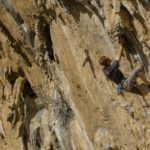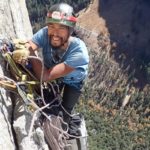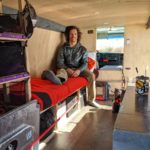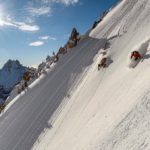Once I was introduced to the outdoor industry, I met a world filled with good people and quickly realized how many people in my life were toxic. Performance, especially improv, is riddled with alcoholism, drug use, and ego.
As a rock climbing coach and mentor, I get to build good people who aren’t relying on applause to make them feel good.
-Jacob Bach, climbing coach and Membership and Community Organizer at Adventure Rock in Milwaukee, WI.
Rooted in a performance background, rock climber Jacob Bach brings a passionate approach to rock climbing and coaching
Milwaukee’s climbing coach, Jacob Bach, comes from a performance background mostly composed of dance and improv comedy. He has worn many hats in the Milwaukee community such as LGBTQ activist, the owner of multiple companies including a guiding company and a theater company, and podcast host. He currently works as a youth rock climbing coach, the membership and community organizer at a local gym, volunteers as a leader of one of the most diverse Boy Scout troops in Wisconsin, and sings in a local indie-folk band.
In this interview, Jacob discusses the similarities and differences between the performing arts and rock climbing, the joys of working with youth, and why he’s proud to call Milwaukee, Wisconsin, home.

Alpine Club, V9 in Devil’s Lake, WI
Peak Points:
Hometown: Milwaukee, WI
Age: 27
Years climbing: 5
Favorite style of rock climbing: “slightly overhanging, full-body tension, credit card crimps”
Favorite trip: “rampage day” at Devil’s Lake with 7 kids and one parent: “We did literally the entire lake in a day. Bouldering.”
Favorite crag food: Half of a Subway sandwich and Boujee Gouda cheese crusted with black pepper
Favorite old movie: Mary Poppins and Hello Dolly
Hardest send: Jenga, Devil’s Lake, WI, V7
Current Projects: Alpine Club (V9, Devils Lake, WI pictured above), and Shark’s Tooth, V8, Devil’s Lake, WI
How did you get into the performing arts?
As a child, I loved performing. I loved old fashioned musicals from the 1940s, ’50s, and ’60s, with real brassy broads and big headdresses. I grew up watching the golden age movie musicals and knew, despite it being the 90’s, that I wanted to be a performer.
I started taking ballet, tap, and jazz dance classes in the 3rd grade and by high school, I was immersed in acting and musicals. Starting at age 16, for the next ten years, I did improv through the ComedySportz high school league. In 2010, I started a theater company called “The Improvised Musical” that toured all over the country and which afforded improv teaching opportunities in Texas, Illinois, New York, Wisconsin, and Minnesota.
I loved dance and theater for all the right and some very wrong reasons. Performing is nothing but ego. You want people to pay you to watch you.

photo credit Bloodgood Foto @bloodgoodfoto
A lot of people would say that ego can work its way into the rock climbing community as well, what’s the difference?
It’s a different type of ego. Your opinion of when something is funny and my opinion of when something is funny is different and neither of us is right. When someone finishes a 5.14d, they feel good and they should. Because they accomplished something difficult. Which reminds me about a really severe injury where I broke my talus bone which connects your ankle and heel. After the surgery, I was on such intense pain meds that I couldn’t sleep for two weeks and then I couldn’t walk for about five months.
About a month after I started walking, I went on a trip to Colorado. That trip killed my ego. I had a rough time. We were going to do Diamond’s Casual route (Trad 5.10a Grade IV) because all three of my rock climbing partners had gotten injured that year and we were going to buck up and do the Diamond as a celebration send. I could not even get up to Upper Chaos (Upper Chaos Bouldering). It was so hard.
That trip taught me where “try hard” comes from. There’s a traverse there called the Girlfriend Traverse, which starts as a V7/V8, and then transitions into The Kind which is only a V5. It was the end of the day and I was bearing down on these credit card crimps, doing techy moves while my fingers split open and started bleeding. I bust out to this gaston sloper and I finally hit it. I was screaming the entire time and it was the first moment I could feel the energy being sucked from my gut. At the top, I meant to move my foot over but my entire body just collapsed. I had used all of my energy. That moment of awareness made me realize that if I push myself hard enough, even if i scream in agony and bleed, but stay focused, I can freakin’ try-hard and succeed.
How has your experience in the performing arts carried over to rock climbing?
What I’m really interested in right now is the crossover between movement in an expressive way and movement in an athletic performance way. I love how much cross over there is between ballet and rock climbing. Executing a tendu in ballet, which is keeping your toes touching the floor with a leg stretched out away from the body, is just like how we toe into a hold. And the plie, which is bending both knees and straightening them again while keeping feet firmly on the ground, is literally the basic mechanics of a dyno, while executing it on a wall.
How can I take these creative techniques and then apply them to a sport? Rock climbing, which is a very expressive, individual sport, encourages creative improvisational skills similar to a dance routine.
I like the way Ayo [Sopeju] (visual artist and setter at the Minneapolis Bouldering Project gym) puts it, “Climbing can be an expression. And it can be as simple as someone setting a route, such as, “I’m expressing that this is a 5.11” or “I’m expressing grief” or “I’m expressing happiness”. Expression allows a dancer or climber to easily get into the flow of their movements, and then to sharply focus, in moments of confusion or panic.
One time, I was on this 5.13 , with flowing movements, dancing up this rock. It was a very ballet-style movement. Afterward, someone said “I’ve never seen you climb that well before. You looked so beautiful on that route.” And I realized that, oh, not everyone works the same way that Adam Ondra (Czech professional rock climber) does. No one is the same climber. We all have to figure out what it is that makes us good at this.
What is your main drive towards working with youth?
I had a good group of adults that helped raise me that I really looked up to, including my family. There were times though that I wish I had someone to talk to, but didn’t. I want to be that supportive adult who fills the void and listens when a kid needs that.
We live in a social media world, where a kid takes a picture of themselves and then sends it to a hundred people. They’re being taught that you have to be with everybody all the time, always connected. I think part of what we need to do is allow kids to be the age that they are, to put down the phone or tablet and just exist in the world.
I love working with teenagers especially. They’re figuring out how to be themselves as they grow into their adult bodies and deal with adult emotions. There’s a lot going on in their lives. You get to be there for them, which is such a cool privilege to me.
It seems like you use coaching as a tool to teach a lot more than just rock climbing. Could you expand on that?
Before rock climbing coaches existed everyone had a mentor in climbing. Mentorship has been replaced with the internet, which allows new climbers to watch professionals like Daniel Woods climb at Red Rocks or Rocky Mountain National Park, and then get psyched up to go try it on their own. There’s a lack of one on one personal relationships where someone says “I’m going to make you the best person possible and climbing is the way that I’m going to do that,” which is very much what I believe.
Earlier this year I had one of the best climbing trips of my life. I took seven kids to Devils Lake State Park, north of Madison, Wisconsin, for an overnight trip. While there, we had a rampage day and bouldered the entire time. One of the lasting memories from that experience was teaching them how to be a crew and then stepping back as they figured out what it means to be rock climbing partners.

Working his favorite “credit card crimps” on Boulder Across from Pete’s Pebble, a V2 at Devil’s Lake State Park, WI
You previously owned a guiding company?
In 2017, I had a backpacking and white water rafting company called Good Land Guides, with the idea of introducing people to the state of Wisconsin through these activities. Having your own business is hard though! Managing paying taxes and doing paperwork wasn’t a good fit for me.
What I really wanted out of business ownership was to organize big volunteer days at state parks. Wisconsin has over 60 beautiful state parks and state forests, many state trails, national scenic riverways, a national lakeshore, and one of the only national dark skies in the country. After Governor Scott Walker made huge budget cuts to the DNR [Department of Natural Resources], I decided that I I wanted to give back to the State Park System. So through Good Land Guides, I organized a volunteer day at Devil’s Lake, which attracted over 300 people to help clean the park and maintain the hiking trails. It was one of the most exhausting days of my life, but it was an amazing experience working with all the volunteers.
Milwaukee is not exactly what people think of when they think of rock climbing. Why Milwaukee? Do you see yourself leaving the Midwest one day?
Milwaukee’s affordable. I have a full-time job in the industry here. My family’s here. My friends are here. I get anywhere in the country relatively easily because we’re in the middle of everything.
It always blows my mind when people move specifically for rock climbing, starting their life completely over in a new place. That’s wild to me. There are so many other factors in life. I identify as a climber but that’s not the only thing that makes me up.
I feel lucky because I’m also a part of a small climbing community which is being developed right now. There are a ton of strong rock climbers from Wisconsin and this state is riddled with rock. There are crags that people will never even know about.
I have Wisconsin tattooed on me, I’m committed to this state.
How has being gay affected your experience in the rock climbing community?
Being gay held me back from sports for a long time. Not because anybody said it, but because in media and culture we don’t have a representation of queer athletes. There were no queer athletes in any sports for decades. Even now it’s news when it does happen.
If I had a queer kid on the team I’d like to think that they could look at me and think “I’m allowed to do this. I’m allowed to try really hard and I can climb better than some people.” I want them to be able to feel that. Or if I have a straight kid on the team and their friend at school said something about gay people they can say “well, my climbing coach is gay and he’s super strong.” Setting an example for all kids is what I care most about.


Gay Gigolo, V2, Devil’s Lake, WI








